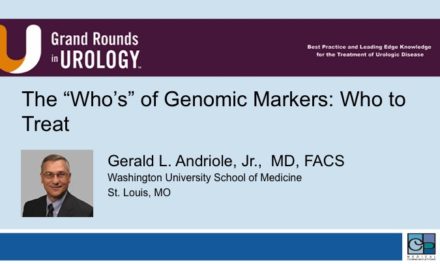Michael H. Johnson, MD, FACS, presented “Doctor Knows Best? Why Prostate Cancer Care Must Be Transformed Into Digital Health” during the virtual 5th Global Summit on Precision Diagnosis and Treatment of Prostate Cancer in September 2021.
How to cite: Johnson, Michael H. “Doctor Knows Best? Why Prostate Cancer Care Must Be Transformed Into Digital Health.” September 2021. Accessed Jul 2025. https://grandroundsinurology.com/doctor-knows-best-why-prostate-cancer-care-must-be-transformed-into-digital-health/
Doctor Knows Best? Why Prostate Cancer Care Must Be Transformed Into Digital Health – Summary
Michael H. Johnson, MD, FACS, Associate Professor and Vice Chair of Urology at Washington University in St. Louis, discusses why digital health solutions must revolutionize prostate cancer care. Dr. Johnson asserts that physicians and patients are overwhelmed with data, and advocates for a digital platform that can provide an architecture to describe a patient’s prostate cancer history, allowing treatment decisions to be better defined. He then draws a distinction between what he calls gizmo idolatry and unicorn technology, explaining that the value in the latter is oftentimes realized 10-15 years into the future, it solves a problem in a superior way and overcomes barriers that previously limited growth (e.g., geographical and other barriers to sharing expertise), and a unicorn technology many times will solve a problem that many do not even recognize exists. He outlines three main challenges in prostate cancer care: risk assessment, diagnosis and prognosis, and novel treatments for advanced disease. Dr. Johnson then summarizes recent advancements in prostate cancer treatment and explains that a digital platform can assist with optimizing value-based prostate cancer care and lead to improved outcomes, increased quality of care, efficiency, provider and patient satisfaction, and reduced cost. Dr. Johnson closes by asserting that we are at an inflection point in medicine when digital medicine has the opportunity to transform patient care and treatment in ways that are both instantaneous but also far-reaching. He cites the most important aspect of this transformation will be the restoration of doctor-patient interaction and the comfort for doctors and patients in knowing that the options they discuss are not only based on the practitioner’s own experience and expertise, but are informed by the most current data and recommendations from across the field.
The Virtual Global Summit on Precision Diagnosis and Treatment of Prostate Cancer brings together key international opinion leaders of every clinical subspecialty involved in patient care. This event is an integral part of the AdMeTech Foundation’s Annual Summit, which was established in 2016 and became seminal in shaping the state of the art and future vision for precision care. The goal of this event is three-fold: 1) Educating the key stakeholders; 2) Supporting a sustained cross-disciplinary dialogue and consensus on the best emerging clinical practices and research priorities; and 3) Expediting clinical adoption of promising novel diagnostics and therapeutics. For more educational activities from this virtual event, visit our collection page.
ABOUT THE AUTHOR
Dr. Johnson is an associate professor and vice chair of urology at Washington University in St. Louis. He has held positions in private practice at Oregon Urology Institute and assistant professor at the Brady Urological Institute at Johns Hopkins Hospital. Dr. Johnson received his undergraduate degree from Dartmouth College, his medical degree from the University of Washington, his residency at Washington University in St. Louis, and his fellowship in urologic oncology at the Brady Urological Institute at Johns Hopkins Hospital.
Dr. Johnson's research experience includes funding from the National Institutes of Health to advance "big data" efforts for precision medicine in kidney cancer as well as Johns Hopkins to further prostate cancer research and telemedicine.
Dr. Johnson has received numerous awards for his teaching and research efforts. He has authored many scientific publications, including research articles, videos of surgical techniques, and textbook chapters.




